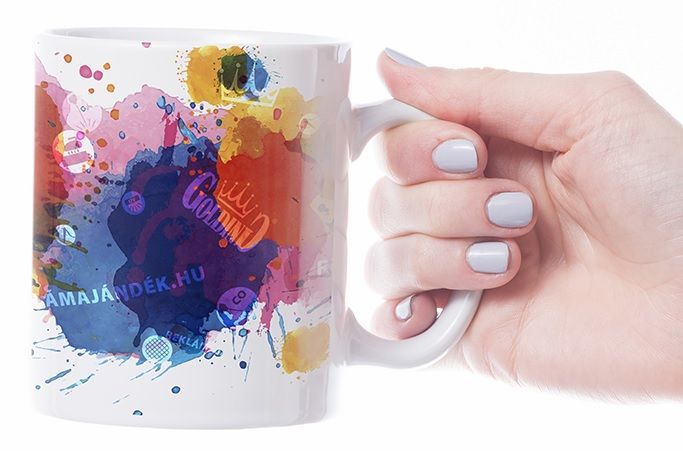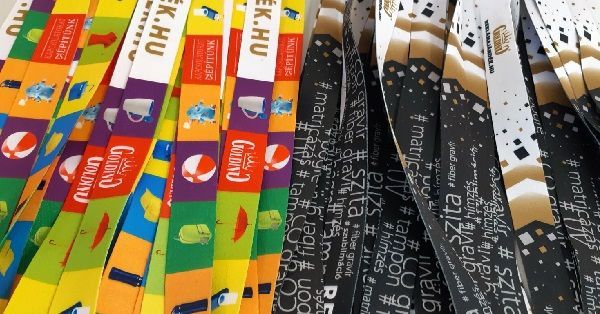What is Sublimation Printing?
Sublimation printing is a unique process that uses high heat and pressure to transfer graphics directly from sublimation paper onto the selected product. The combined effect of heat and pressure integrates the graphic into the material, resulting in a durable and vibrant finish.

How does this technology work?
The working principle of sublimation printing is based on the use of special heat-sensitive ink that turns into a gas at a minimum temperature of 160°C. During the printing process, the ink applied to the transfer paper is transferred to the target surface using a heat press. The heat and pressure cause the ink to penetrate the material, becoming an integral part of it. This technology is particularly effective on polyester materials, as well as specially coated ceramics and plastics.
Advantages of Sublimation Printing
- Durability: The graphic becomes part of the material, so it does not wear off, crack, or fade during washing.
- Image Quality: Produces high-quality, sharp, and detailed images.
- Vibrant Colors: The sublimation technology allows for the display of vivid and rich colors.
- Breathability on Textiles: The printed textile retains its breathability as the ink does not block the pores of the fabric.
- Design Flexibility: There are virtually no design limitations, whether it's the number of colors or the complexity of the graphic.
- Applicability to Various Products: Suitable for a wide range of items, such as T-shirts, ceramic mugs, etc.
- No Minimum Order Quantity: Perfect for printing as few as one item or as many as a hundred.
- Smooth and Glossy Finish: The sublimated surface remains just as smooth and glossy (on a ceramic mug) as the non-printed areas, and in textiles, the printed areas of synthetic fabrics retain the same soft drape and sheen as the unprinted parts.
- Environmentally Friendly: Compared to other printing methods, sublimation is an eco-friendly process.
Disadvantages of Sublimation Printing
- Slow Process: Sublimation printing can be relatively time-consuming, especially for larger quantities.
- Material-Specific: It works well only on certain materials, such as high-polyester content fabrics or specially coated ceramics and plastics.
- Requires Light-Colored Surface: The technology works best on white or light-colored surfaces because the ink does not show up on dark backgrounds. True-to-color results can only be achieved on white base materials, as the base color affects the shade of the print. Black sublimation can be applied to colored surfaces.
- Surface Condition: If the material is wrinkled or some parts of the product are inaccessible, the covered areas will remain white.

Applications of Sublimation Printing
Textile Branding:
Sublimation printing on textiles, such as T-shirts, polo shirts, sweaters, scarves, and other fabrics, is especially popular in the fashion and advertising industries. To achieve durable and vibrant prints, the textile must contain at least 80% polyester. Polyester ensures that the ink penetrates deeply into the fibers, making the finished design wash-resistant and abrasion-free. Although handling the textile during sublimation printing requires care, the result is a highly durable and high-quality product.
Logo Branding on Promotional Items:
The branding of promotional items like mugs, keychains, toys, office supplies, event accessories, lanyards, wristbands, and other accessories using sublimation printing is also widely practiced. For example, glass or ceramic mugs, phone cases, and bags can be decorated with this method, although such items often require special coatings to ensure proper ink adhesion. Mug presses are particularly popular, allowing for the creation of personalized mugs, which can be used as custom gifts or promotional items. The use of transfer paper is crucial here, as it ensures the precise and lasting transfer of the design onto the surface of the promotional item.
Printing on Glossy Paper:
One of the most common uses of sublimation printing is printing photos on glossy paper. This method is often used in photo booths, where high-quality photos can be quickly produced. In addition, there are special desktop printers capable of printing on cards or other types of paper, making them ideal for creating personalized gifts.
Glass Decoration:
Although less common, sublimation printing can also be applied to glass surfaces. However, glass requires special pre-treatment to ensure proper ink adhesion. The result, though, can be unique and durable, particularly in the case of decorative items or custom photo prints.
Summary
Sublimation printing is a versatile and effective technology that can be applied to various surfaces. Whether it's textiles, promotional items, or other accessories, sublimation printing enables the creation of unique and durable designs that maintain their color and quality over time.
Get in touch with us, and with over 30 years of experience, we will handle the task from product design to packaging and delivery. Thanks to our significant inventory, you are sure to find what you need with us, whether it's a pad-printed water bottle, mechanical pencil, notebook, folder, kitchen utensil, or any other promotional gift for promoting your business. In our facility, we print, engrave, stitch, iron, and more on anything and everything.
For a summary guide on other available branding technologies, check out this blog post.
Images source: own photos.





